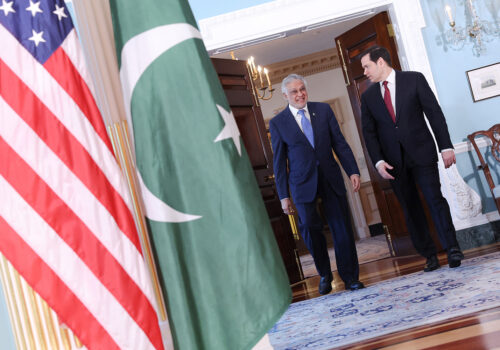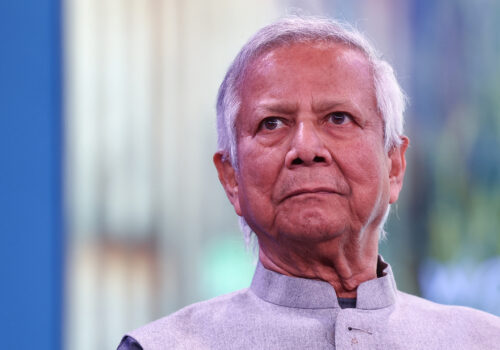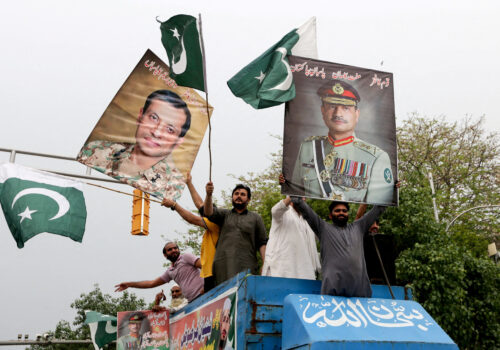Bangladesh’s revolution is at a crossroads. Open elections are the best way forward.
A year ago, Bangladesh exhaled. Students and citizens, armed with nothing but courage, swept through Dhaka’s streets like a cleansing monsoon, washing away Bangladeshi Prime Minister Sheikh Hasina’s fifteen-year reign. The world watched as a seemingly impossible revolution unfolded before its eyes.
Now that the monsoon has evaporated, citizens find their revolution pickpocketed while they were still celebrating. Extremists are emboldened, minorities are oppressed, political rivals are targeted, and the economy is wobbling. Bangladesh isn’t just faltering; it’s performing a painful autopsy on its own revolutionary aspirations. Without a free, fair, and inclusive election—soon—the nation teeters not at democracy’s threshold but at anarchy’s precipice.
Warning signs flared in the weeks after Hasina’s fall on August 5, 2024. Religious extremists demolished sculptures and artworks across the country. Soon after, As-Sahab, al-Qaeda’s official media wing, released a twelve-page message hailing the events as a victory for Muslims, praising the destruction of sculptures and portraying Bangladesh as the beacon of hope for the victory of Islam in the region. Then in March, Hizb ut-Tahrir, a terrorist organization designated in Bangladesh since 2009, paraded through Dhaka’s streets with its “March for Khilafah,” with advance publicity and without meaningful government interference.
These terrorists’ stunts did not happen in isolation. The interim government’s opening act was dropping charges against Jashim Uddin Rahmani, the top figure in al-Qaeda-affiliate Ansar al-Islam. More than fifteen thousand inmates, including top militants, walked free on expedited bail. In coordinated prison breaks across the country, ninety-eight convicted Islamic terrorists escaped the prison. Today, jihadi flags flutter on streets while authorities look away. Muhammad Yunus, chief adviser for the interim government, has assured that extremism will not resurface in Bangladesh, yet evidence suggests otherwise. His administration isn’t fighting terrorism; it’s offering terrorists a corner office with a view.
The July student-led uprising owed much of its power to women at the forefront, yet in this fundamentalist renaissance, they’re the first casualties. Women are harassed for how they dress, chastised for not covering up, and in some places outright forbidden from markets. Hatred against women hasn’t just increased, it’s been sanctified. In March, when locals nabbed a man for sexually harassing a Dhaka University student on her campus over her “improper” dress, Islamic radicals laid siege to the police station to free him. The fanatic mob live-streamed their assault, bailed him out, draped him in garlands, thrust Qurans into his hands, and anointed him a warrior of faith. They pried her details from police records and unleashed a torrent of threats that forced her to withdraw complaints—all while authorities watched and sat on their hands. In June, in at least two similar incidents, the assailants who publicly beat women walked free on bail and received heroic welcomes with victory parades.
The assault on Bangladesh’s pluralistic identity parallels women’s marginalization. Religious minorities have faced a renewed wave of violence since the interim government took power. The Bangladesh Hindu Buddhist Christian Unity Council has documented 2,442 attacks between August 2024 and June 2025. Even Muslim minorities are not spared. Dozens of Sufi shrines and Ahmadia mosques, traditionally targets of Islamic militants, have been razed. When confronted, Yunus offered a head-scratching defense: These were “political” attacks, not communal ones.
This defense is hardly exculpatory. If taken at face value, it suggests that minorities, traditionally supporters of the fallen regime (Awami League, or AL), now face targeted abandonment by a state indifferent to their plight. The government’s occasional interventions have decreased attacks, but they still persist at an alarming rate.
The interim government promised to restore the rule of law. To it, the previous regime’s darkest legacy was its penchant for enforced disappearances and custody killings. Yet Bangladesh now experiences an eerie déjà vu. In the first eleven months of this government, twenty-seven people have reportedly died in extrajudicial killings—seven more than 2023’s entire tally. The government recently decided to withdraw politically motivated cases filed under the AL government. Yet, more than 300,000 people now face murder and related charges after Hasina’s fall. Reports say these cases include fabricated accusations targeting journalists, human rights activists, celebrities—basically anyone who appeared close to the former government. The scales of justice haven’t been balanced; they’ve simply been tipped in the opposite direction. To ordinary Bangladeshis, this government has mastered the art of condemning yesterday’s injustice while refining tomorrow’s.
The law-and-order situation has deteriorated beyond recognition. Crime now pervades the country, while mobs move with impunity in the streets. Since the government took charge, Bangladesh has registered 179 mob killings. While some law-and-order breakdown is expected after such political upheaval, the magnitude suggests a deeper failure. The government insists that the police are not fully operational. Still reeling from their violent action during July’s clashes, law enforcement’s morale remains shattered. Yet remarkably, when the government rolled out “Operation Devil Hunt” this February to restore public order, this supposedly demoralized police force arrested around twenty thousand people—almost exclusively AL supporters, often on apparently fictitious cases. In May, the number ballooned to 48,400—likely the largest mass arrests in the nation’s history. This hardly resembles a demoralized force; instead, their morale appears selectively repurposed and weaponized.
Elections: The only way forward
Amid this carnival of chaos, only a free, fair, and inclusive election can pull Bangladesh back from the brink. The interim government consists of technocrats with little to no government experience. None are politicians, and they lack the political capital to act decisively. By contrast, an elected government with grassroots support can bring public trust, restore state authority, and act decisively. Just as important, an elected government can reestablish bureaucratic discipline and security chain-of-command, which has frayed under the current regime. The bureaucracy follows power, but it responds best to stability. With electoral incentives, a democratic government is more likely to deliver effective governance and plug the security vacuum that extremists now feed upon. Unlike the current regime, which operates over a dissolved parliament, a democratic government would be accountable to the public and parliament.
In a promising sign, Yunus declared that an election could be held in April 2026, and possibly as soon as February, pending sufficient progress on judicial and political reform. However, uncertainty still clouds the election. Suspicion has grown that the government has deliberately postponed elections to give the National Citizen Party (NCP), fashioned by the student leaders of the July 2024 uprising, and its Islamist allies time to transform street clout into electoral viability.
But delay only deepens the crisis. In the span of a year, the interim government could not deliver any meaningful reform. Each passing day is chipping away at Bangladesh’s stability while undemocratic forces tighten their grip. Much more delay, and Bangladesh may miss its final exit ramp before careening off democracy’s cliff entirely.
Beyond timing, the crucial question is who gets to participate: Should Hasina’s fallen party appear on the ballot?
The interim government banned all activities of AL and all its affiliates, citing national security concerns, after pressure from NCP and several Islamist parties. The election commission also suspended AL’s registration, effectively barring it from the next election. The government also accuses AL of not showing any remorse and stoking unrest that makes people angry.
Critics of the AL have ample ammunition—fifteen years of rule marked by progressively less competitive elections, systematic corruption, suppressing dissent, and a violent crackdown on the July protest that claimed over eight hundred lives.
Anger has its place, but democracy thrives on choice, not vengeance. Legal trials of AL leaders can—and should—coexist with the AL’s electoral participation. Allowing the party on ballots doesn’t equal absolution; instead, it ensures justice without collective punishment of supporters who weren’t culpable. Banning the political party that has won the most elections in Bangladesh’s history, played a role in its founding, and retains a significant voter base risks replicating authoritarian tactics that AL itself is often accused of. Such exclusion may effectively disenfranchise a significant segment of voters, undermine electoral legitimacy, push politics back into the streets, and set a dangerous precedent where each government purges its rivals.
Bangladesh’s lost revolution has reached its moment of truth. What began as a promising uprising now flirts dangerously with becoming exactly what it sought to overthrow—a system in which power, not principles, determines who gets to participate in democracy. The path forward is clear, if difficult: Hold elections soon, make them inclusive, let justice target individuals rather than parties, and allow Bangladeshis themselves to choose their future. Anything less would turn their democratic spring into an authoritarian winter, with a brief, illusory thaw in between.
Wahiduzzaman Noor is a Bangladeshi national security professional and former diplomat at the Embassy of Bangladesh in Washington, DC, with expertise in South Asian affairs, Indo-Pacific security, and counterterrorism.
Further reading
Sun, Jul 27, 2025
Pakistan’s Ishaq Dar on a trade deal with Trump, balancing the US and China, and peace with India
New Atlanticist By Katherine Golden
Dar, the Pakistani foreign minister and deputy prime minister, spoke at the Atlantic Council during his trip to Washington to boost US-Pakistan ties.
Fri, May 23, 2025
Bangladesh may have ended its India-China tightrope game, but it must continue to tread carefully
New Atlanticist By
With Bangladesh outgrowing its small-power past, the stakes of the country's geopolitical choices have never been higher.
Mon, May 19, 2025
Amid India-Pakistan tensions, the US must rebalance its security priorities in South Asia
New Atlanticist By
The United States should make Pakistan’s Major non-NATO Ally status contingent on Islamabad’s counterterrorism performance and economic reform.
Image: May 9, 2025, Dhaka, Dhaka, Bangladesh: Protesters gather near the official residence of Bangladesh's Chief Advisor Office of Interim Government, Muhammad Yunus, demanding a ban on the ousted Sheikh Hasina's party, the Awami League, in Dhaka on 09 May 2025. (Credit Image: © Abu Sufian Jewel/ZUMA Press Wire. REUTERS)



